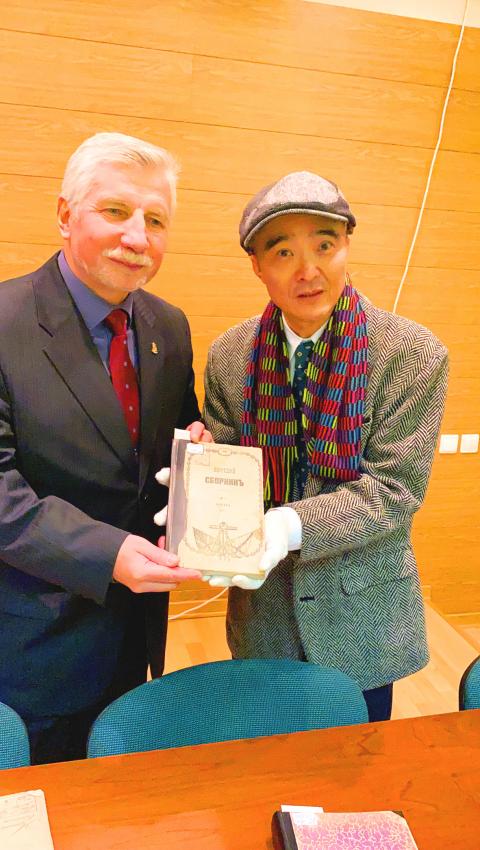The Russian Empire in 1875 sent a naval vessel to Taiwan proper to investigate after Japan attacked the island the year before, Russian historical records showed.
In 1871, a Ryukyuan boat that was returning to Miyako Island after paying annual tribute to the seat of the Ryukyu Kingdom in Naha was shipwrecked off the southern coast of Taiwan after it was caught in a typhoon.
The 66 people aboard the vessel traveled inland, entering Paiwan territory, but were attacked due to a misunderstanding caused by the language barrier, and 54 were killed.

Photo courtesy of Yang Meng-che
The attack later became known as the Mudan Incident.
The Japanese government sought compensation from the Qing court over the killings, but was told that the incident was out of the court’s hands as it involved “savages.”
Japan used the incident to challenge Qing sovereignty over Taiwan and in May 1874 sent a naval force to attack the Paiwan in retaliation.
The incident received worldwide attention at the time, including in the Russian Empire, which dispatched its navy to investigate, the documents showed.
National Taipei University of Education professor Yang Meng-che (楊孟哲) on Nov. 12 visited the Russian Academy of Science’s Taiwan Research Center to examine the documents and talk to researchers.
Yang met with the archive’s director at the Russian State Naval Archive in Saint Petersburg, and examined the original records by naval officer and Asia researcher Pavel Ivanovich Ibis, who had visited Kaohsiung (then Takao) in 1875 aboard the Russian cruiser Askold.
After landing in Kaohsiung in January, Ibis spent the next two months traveling north to learn more about the Aborigines, the records showed.
Ibis was interested in finding out whether Taiwan’s Aborigines were related to those in other Asia-Pacific islands, Yang said, adding that he visited 13 Aboriginal communities in Taiwan, becoming the first European to do so.
Through a translator, Ibis gathered information for Russian authorities about the communities’ lifestyles and their military capabilities, Yang said.
Ibis’ report was published by the Russian military the following year, Yang said, adding that Taiwan researchers in Russia consider the report an impartial account of the Aboriginal communities.
The report was important for foreigners researching the incident and Taiwan’s strategic importance, Yang said.
“Taiwan has had few exchanges with Russia aside from Chiang Kai-shek’s (蔣介石) treatise on the Soviet-China relationship, or the aid provided by Russia following the Jiji Earthquake,” Yang said, adding that the documents are invaluable in the face of the limited exchanges.
There are plans to bring the documents to Taiwan next year for an exhibition and have them translated to Mandarin, Yang said.

The brilliant blue waters, thick foliage and bucolic atmosphere on this seemingly idyllic archipelago deep in the Pacific Ocean belie the key role it now plays in a titanic geopolitical struggle. Palau is again on the front line as China, and the US and its allies prepare their forces in an intensifying contest for control over the Asia-Pacific region. The democratic nation of just 17,000 people hosts US-controlled airstrips and soon-to-be-completed radar installations that the US military describes as “critical” to monitoring vast swathes of water and airspace. It is also a key piece of the second island chain, a string of

A magnitude 5.9 earthquake that struck about 33km off the coast of Hualien City was the "main shock" in a series of quakes in the area, with aftershocks expected over the next three days, the Central Weather Administration (CWA) said yesterday. Prior to the magnitude 5.9 quake shaking most of Taiwan at 6:53pm yesterday, six other earthquakes stronger than a magnitude of 4, starting with a magnitude 5.5 quake at 6:09pm, occurred in the area. CWA Seismological Center Director Wu Chien-fu (吳健富) confirmed that the quakes were all part of the same series and that the magnitude 5.5 temblor was

The Central Weather Administration has issued a heat alert for southeastern Taiwan, warning of temperatures as high as 36°C today, while alerting some coastal areas of strong winds later in the day. Kaohsiung’s Neimen District (內門) and Pingtung County’s Neipu Township (內埔) are under an orange heat alert, which warns of temperatures as high as 36°C for three consecutive days, the CWA said, citing southwest winds. The heat would also extend to Tainan’s Nansi (楠西) and Yujing (玉井) districts, as well as Pingtung’s Gaoshu (高樹), Yanpu (鹽埔) and Majia (瑪家) townships, it said, forecasting highs of up to 36°C in those areas

IN FULL SWING: Recall drives against lawmakers in Hualien, Taoyuan and Hsinchu have reached the second-stage threshold, the campaigners said Campaigners in a recall petition against Chinese Nationalist Party (KMT) Legislator Yen Kuan-heng (顏寬恒) in Taichung yesterday said their signature target is within sight, and that they need a big push to collect about 500 more signatures from locals to reach the second-stage threshold. Recall campaigns against KMT lawmakers Johnny Chiang (江啟臣), Yang Chiung-ying (楊瓊瓔) and Lo Ting-wei (羅廷瑋) are also close to the 10 percent threshold, and campaigners are mounting a final push this week. They need about 800 signatures against Chiang and about 2,000 against Yang. Campaigners seeking to recall Lo said they had reached the threshold figure over the